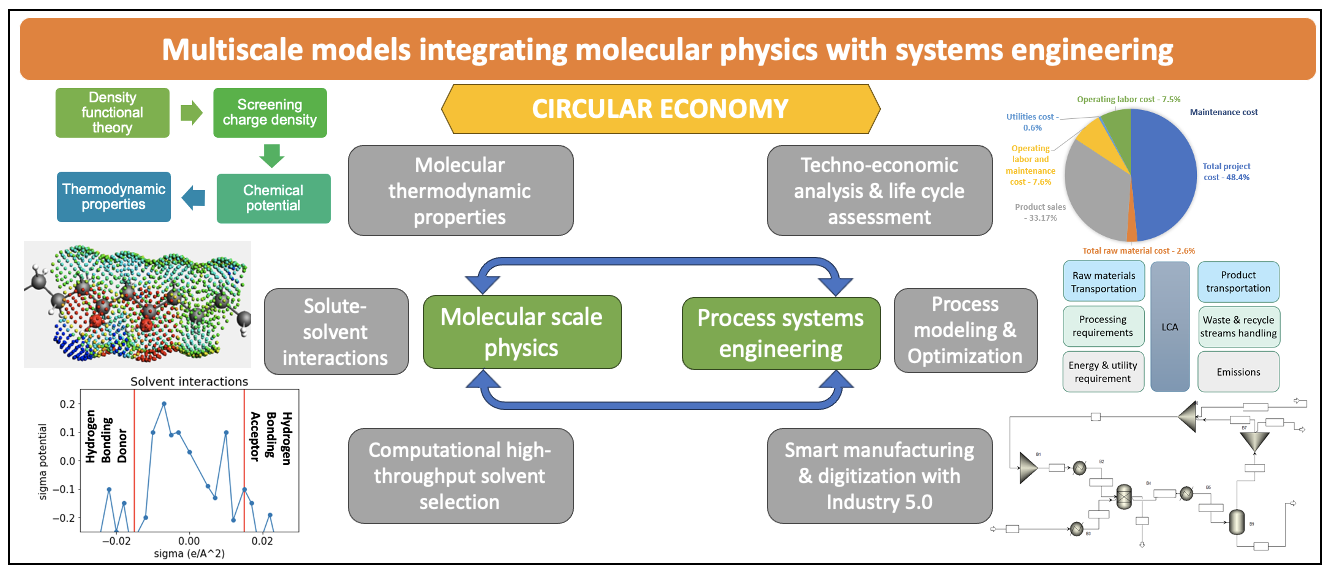2023 AIChE Annual Meeting
(2jo) Integrating Molecular Science with Systems Engineering to Drive Sustainable and Circular Economy
Author
With escalating global population, resource depletion, and high product demand, there is an increasing need to design energy efficient, scalable, and recyclable processes that minimize the negative environmental impact and waste generation. The concept of circular economy (make, use, remake, reuse) as compared to the traditional linear economy (make, use, dispose) lies at the heart of addressing this need. Circular economy focuses on designing sustainable solutions for manufacturing products that integrate recyclability and optimal resource efficiency, thus reducing the burden on raw material reserves. Despite numerous efforts towards developing circular solutions, a persistent challenge for their success is to bridge the gap between the fundamental insights provided at the molecular level and the scalability of the proposed solutions at a systems level.
The vision of my independent research group is to provide a systematic solution to the above challenge by developing multiscale approaches that integrate different scales ranging from molecular physics to systems engineering for designing circular, and sustainable manufacturing systems. These approaches will enable developing comprehensive process designs, which can be employed for integrated molecular and systems level decision making and process optimization. Such designs can further be utilized for flexibility assessment while accounting for uncertainty associated with complex feedstocks, along with smart manufacturing techniques like big data and machine learning to develop resilient systems, in line with the vision for Industry 5.0.
Having worked in the field of process systems engineering and digital twins for pharmaceutical manufacturing during my Ph.D. and integration of molecular scale physics with systems tools for pressing problems like recycling waste rubber tires during my post-doc, I have a strong background in developing such multiscale approaches. Such expertise now uniquely positions my research group to propose pioneering solutions to enable circular economy in the fields of:
1. Upstream (active pharmaceutical ingredient) manufacturing with Industry 5.0,
2. Integrated molecular and process design for polymer upcycling including multi-layer plastics and waste textile recycling,
3. Systems engineering of solvent-based extraction strategies for rare earth metals from ores and e-waste.
Teaching Interests
I strongly believe that teaching and mentoring are amongst the key components to guide the next generation of students in sculpting them to become successful researchers and pioneers in their fields. My core chemical engineering background (bachelors, masters, and PhD) equips me to teach any chemical engineering course. However, with my research expertise, I prefer to teach engineering mathematics, mass and momentum transfer, and process controls. I also plan to develop two elective courses â 1) process systems engineering and 2) modeling solid flow unit operations. The first elective will focus on introducing systems engineering tools like process optimization, sensitivity analysis, uncertainty quantification, and real-time data integration that can be useful for varying applications. The second elective will introduce methods to model solid powder flow in unit operations relevant in industries such as pharmaceutical and catalyst manufacturing.
Mentoring has been a huge drive for me to choose this career path. It has been an incredible journey to mentor two graduate students during my PhD and I feel very fortunate to have had this opportunity. These students have done pioneering work in their fields. One of them recently started his career in one of the top 20 pharmaceutical companies. The discussions we had, has not only broadened my perspective in approaching research problems but also taught me how to sustain a supportive and thriving research group. I am excited to mentor the new generation of young researchers while working towards sustainability and circularity.
